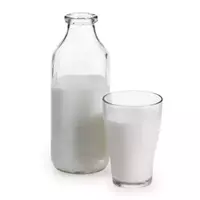Milk drink

There is no doubt that such a food product as milk is especially appreciated by people due to its distinctive taste, as well as beneficial properties. By milk is meant a food product, which contains a nutrient liquid obtained in the process of milking various types of pets. Perhaps the most popular of all time was cow's milk.
As a result of scientific studies of the composition of milk, about 50 different biologically active components were found that bring some benefit to the human body. Milk contains a large amount of calcium, phosphorus, as well as magnesium and sodium. In addition, milk contains such essential trace elements for the human body as iodine, iron, zinc, as well as molybdenum, selenium and others.
Modern food manufacturers use milk to make many types of dairy products. In the food industry, dairy products mean food products in which milk is present in one form or another. In addition, milk is used for the production of milk powder, as well as dairy drinks. It is noteworthy that often buying milk in a grocery store, people do not even think about the composition of the product.
Moreover, few people can distinguish milk from the so-called dairy product. So, how does a milk drink differ from milk? The main difference between milk and milk drink lies in the composition of the latter. If normal milk is obtained immediately after the animals are fed, then the milk drink is the result of the production process. During production of milk beverages one uses both whole and dry milk, into which cheese whey is introduced.
It is worth noting that a milk drink, as well as milk, is considered an incredibly healthy food. However, the milk beverage contains a much smaller number of useful compounds. It is also noteworthy that the appearance, consistency, as well as the taste of the milk drink is practically no different from natural milk. Since the average consumer cannot distinguish milk from milk drinks, many unscrupulous producers take advantage of this.
Milk costs more than milk drinks. By selling milk drinks under the guise of milk, manufacturers make big profits and reduce their costs in the production of cheaper food. Often, milk products are made on the basis of dairy drinks, which are also inferior in taste and useful properties to products produced on the basis of natural milk.
milk drink 79 kCal
The energy value of a milk drink (Ratio of proteins, fats, carbohydrates - ju):
Proteins: 2.7 g (~ 11 kCal)
Fats: 2.5 g (~ 23 kCal)
Carbohydrates: 10.8 g (~ 43 kCal)
Energy ratio (b | y): 14% | 28% | 55%
 Español
Español Français
Français Português
Português Русский
Русский 简体中文
简体中文 繁體中文
繁體中文 日本語
日本語 한국어
한국어 العربية
العربية Türkçe
Türkçe Қазақ
Қазақ Deutsch
Deutsch Italiano
Italiano Українська
Українська
